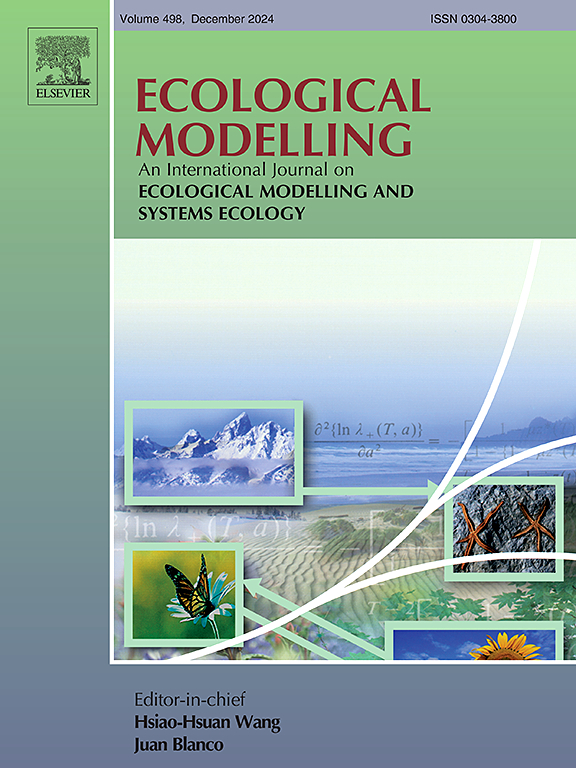Effect of adaptive migration with interaction intensity on the evolution of cooperation
IF 3.2
3区 环境科学与生态学
Q2 ECOLOGY
引用次数: 0
Abstract
Migration (mobility) is a common natural phenomenon and a fundamental element in understanding population dynamics. Adaptive migration (Jiang et al., 2010) has been proposed as an important and efficient mechanism for the evolution of cooperation. In this paper, we focus on the effect of the adaptive migration on the evolution of cooperation by introducing interaction intensity, defined as a probability of the individual’s willingness to interact with an opponent. Our investigations are based on two game models, the Prisoner’s Dilemma game (PDG) and the Snowdrift game (SG). Our results indicate that this modified adaptive migration is much more advantageous for the evolution of cooperation over a larger range of the fraction of empty sites compared to the original adaptive migration mechanism. In moderately sparse populations, the evolution of cooperation can be facilitated through migration. Under this modified adaptive migration, cooperation thrives regardless of the type of game when sensitivity of the stimulus is high. Furthermore, compared to the PDG, the evolution of cooperation in the SG requires lower sensitivity. Finally, in both the PDG and the SG, this modified adaptive migration can induce an outbreak of cooperation in a defector-dominated environment. This reveals that under more efficient resource utilization – here meaning a low fraction of empty sites – modest migration encourages tighter connections between cooperators, which is more conducive to the evolution of cooperation.
具有相互作用强度的适应性迁移对合作进化的影响
迁移(流动)是一种常见的自然现象,也是理解人口动态的基本要素。适应性迁移(Jiang et al., 2010)被认为是一种重要而有效的合作进化机制。在本文中,我们通过引入互动强度来关注适应性迁移对合作进化的影响,互动强度定义为个体与对手互动意愿的概率。我们的研究基于两个博弈模型,即囚徒困境博弈(PDG)和雪堆博弈(SG)。我们的研究结果表明,与原始的适应性迁移机制相比,这种改进的适应性迁移机制更有利于在更大范围的空位点范围内的合作进化。在适度稀疏的种群中,通过迁徙可以促进合作的进化。在这种修正的适应性迁移下,当刺激敏感性高时,无论何种博弈类型,合作都能蓬勃发展。此外,与PDG相比,SG中合作的演变对灵敏度要求较低。最后,在PDG和SG中,这种改进的自适应迁移都可以在缺陷者主导的环境中引发合作的爆发。这表明,在资源利用效率更高的情况下(这里指的是空置场地的比例较低),适度的迁移促进了合作者之间更紧密的联系,这更有利于合作的进化。
本文章由计算机程序翻译,如有差异,请以英文原文为准。
求助全文
约1分钟内获得全文
求助全文
来源期刊

Ecological Modelling
环境科学-生态学
CiteScore
5.60
自引率
6.50%
发文量
259
审稿时长
69 days
期刊介绍:
The journal is concerned with the use of mathematical models and systems analysis for the description of ecological processes and for the sustainable management of resources. Human activity and well-being are dependent on and integrated with the functioning of ecosystems and the services they provide. We aim to understand these basic ecosystem functions using mathematical and conceptual modelling, systems analysis, thermodynamics, computer simulations, and ecological theory. This leads to a preference for process-based models embedded in theory with explicit causative agents as opposed to strictly statistical or correlative descriptions. These modelling methods can be applied to a wide spectrum of issues ranging from basic ecology to human ecology to socio-ecological systems. The journal welcomes research articles, short communications, review articles, letters to the editor, book reviews, and other communications. The journal also supports the activities of the [International Society of Ecological Modelling (ISEM)](http://www.isemna.org/).
 求助内容:
求助内容: 应助结果提醒方式:
应助结果提醒方式:


